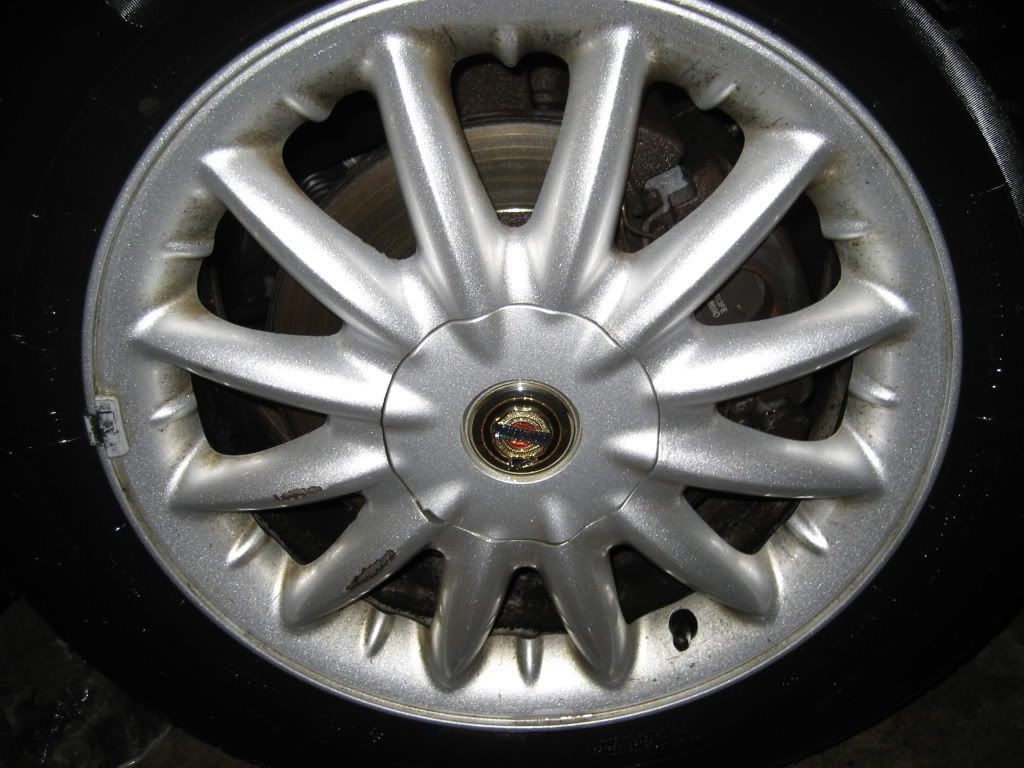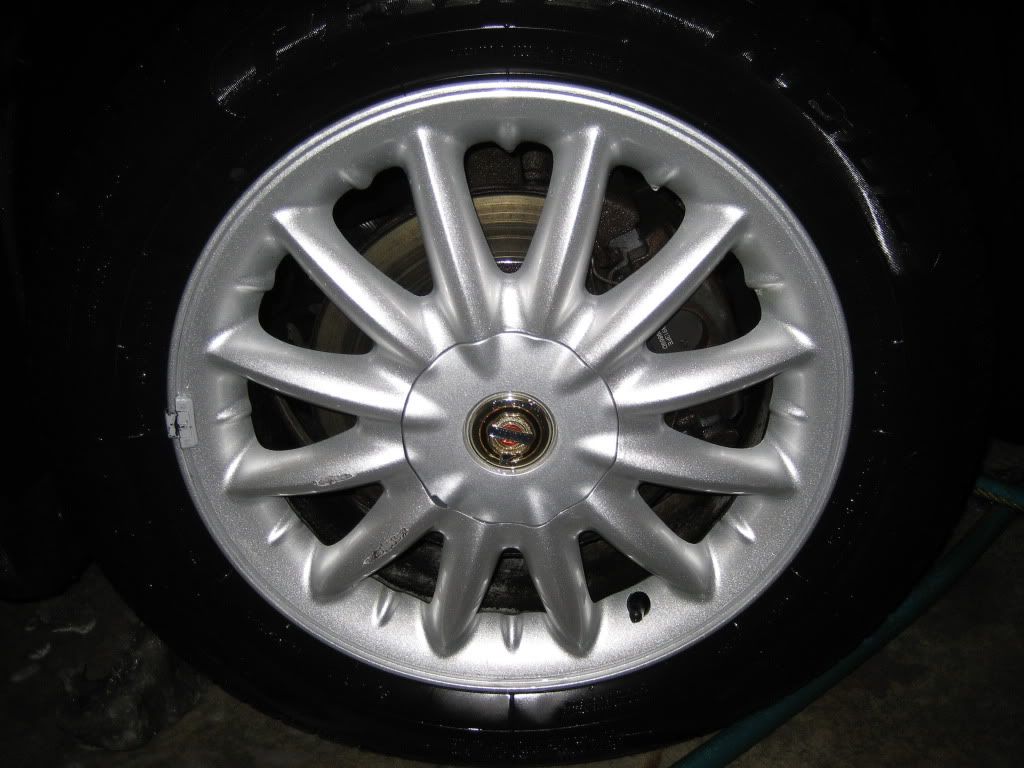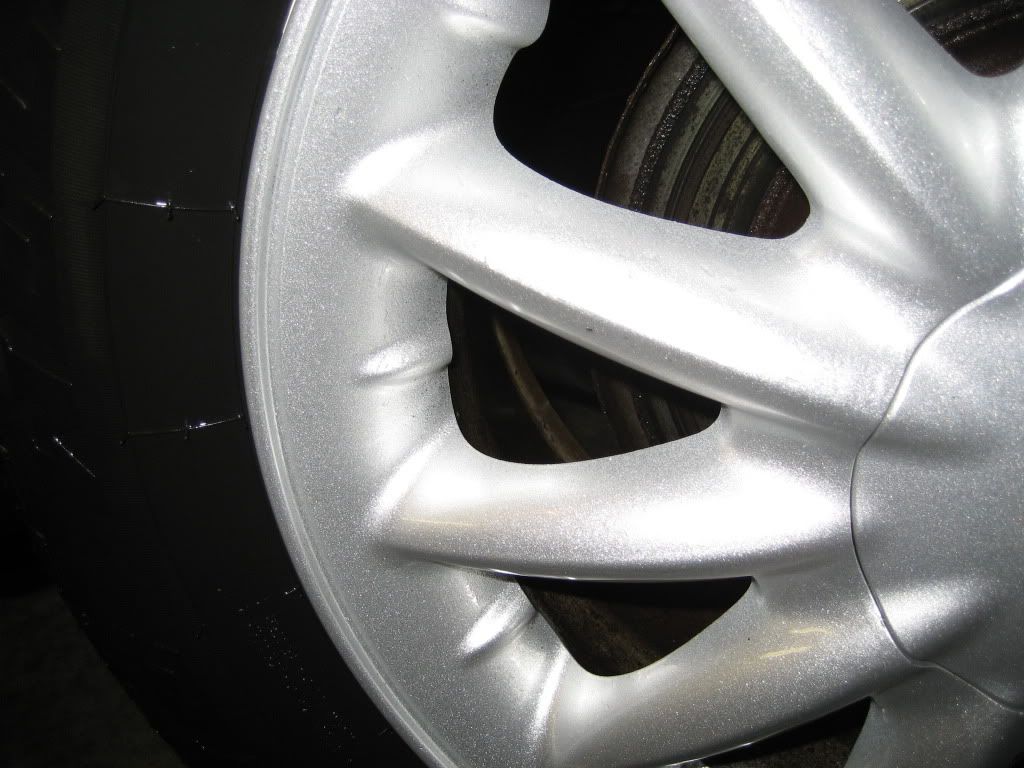Crazy Amos
New member
- Oct 20, 2010
- 1,060
- 0
I know some people have asked about wheel acid and what it can do so I thought I would share this with you.
Sometimes wheel acid is needed. Take this particular case.
When I tell you this keep in mind, I never drive my wifes car….ever.
Well, Sunday we went over to my mother and father in laws for supper and decided to take her car. It was covered with road salt and grime from two weeks of snow, and the wheels were covered with brake dust, all four. We pull out of the driveway, proceed to the stop sign down the road and when I pressed the brakes to stop, all I heard was “KRRRRRR-CH-CH-KRRRRRR”, pure metal on metal grinding!
I asked when in the heck (for lack of a better word) did this start making this noise? She said “Well, it started squeeking a couple weeks ago and it just started sounding like that.” Just to let you know, it was probably more like a month ago…..
Fast forward to last night. I bought new pads and rotors all the way around to replace the old. But, before I did, I wanted to clean the brake dust off of the wheels and the ice out of the wells to make my job a little cleaner. I sprayed OPC at 1:1 on the wheels, tires and wells then cleaned with a wheel brush. When I rinsed I found brown stains and pits all over the inside of the spokes. That told me the brakes had been like that for a while, the metal had corroded the coating and embedded itself into the wheel itself. Since the OPC and 105 with a Powerball didn’t work, I went straight for the acid.
I put on my nitrile gloves and mask open the garage door and sprayed the acid (10:1) directly onto the wheel after soaking the nearby panels with water. While working one wheel at a time I let it dwell for about 10 seconds and agitated with the same brush and soap as I did before, rinsed and then soaked the wheel and everything behind it again with OPC to neutralize any left over acid (rinsed well but wanted to be safe), dried them and applied 2 coats of CG Wheel Guard to each wheel.
The results were pretty good. Take a look below. Pics are before sealing.
Note: Do not ever use acid as your primary cleaner. It is nasty stuff and should be avoided whenever possible. If you decide to use it, dilute to the proper amount, wear proper protection, rinse for at least a minute and always re-seal the wheel because it will strip everything off including the coating if it sits too long.

After OPC and brush. Check out the rotor behind the wheel.

This isn't the same wheel - thought I took a closeup pic but didn't. They all looked the same though. You get the idea.
Missed a couple spots but not hitting it again with it.


I have had the same gallon of this stuff for years and I don't use it often but its nice when needed.
I am sure their are plenty of people who will say not to use this stuff, and I have to agree-it hate it. But in times like this, its all that worked.
Sometimes wheel acid is needed. Take this particular case.
When I tell you this keep in mind, I never drive my wifes car….ever.
Well, Sunday we went over to my mother and father in laws for supper and decided to take her car. It was covered with road salt and grime from two weeks of snow, and the wheels were covered with brake dust, all four. We pull out of the driveway, proceed to the stop sign down the road and when I pressed the brakes to stop, all I heard was “KRRRRRR-CH-CH-KRRRRRR”, pure metal on metal grinding!
I asked when in the heck (for lack of a better word) did this start making this noise? She said “Well, it started squeeking a couple weeks ago and it just started sounding like that.” Just to let you know, it was probably more like a month ago…..
Fast forward to last night. I bought new pads and rotors all the way around to replace the old. But, before I did, I wanted to clean the brake dust off of the wheels and the ice out of the wells to make my job a little cleaner. I sprayed OPC at 1:1 on the wheels, tires and wells then cleaned with a wheel brush. When I rinsed I found brown stains and pits all over the inside of the spokes. That told me the brakes had been like that for a while, the metal had corroded the coating and embedded itself into the wheel itself. Since the OPC and 105 with a Powerball didn’t work, I went straight for the acid.
I put on my nitrile gloves and mask open the garage door and sprayed the acid (10:1) directly onto the wheel after soaking the nearby panels with water. While working one wheel at a time I let it dwell for about 10 seconds and agitated with the same brush and soap as I did before, rinsed and then soaked the wheel and everything behind it again with OPC to neutralize any left over acid (rinsed well but wanted to be safe), dried them and applied 2 coats of CG Wheel Guard to each wheel.
The results were pretty good. Take a look below. Pics are before sealing.
Note: Do not ever use acid as your primary cleaner. It is nasty stuff and should be avoided whenever possible. If you decide to use it, dilute to the proper amount, wear proper protection, rinse for at least a minute and always re-seal the wheel because it will strip everything off including the coating if it sits too long.

After OPC and brush. Check out the rotor behind the wheel.

This isn't the same wheel - thought I took a closeup pic but didn't. They all looked the same though. You get the idea.
Missed a couple spots but not hitting it again with it.


I have had the same gallon of this stuff for years and I don't use it often but its nice when needed.
I am sure their are plenty of people who will say not to use this stuff, and I have to agree-it hate it. But in times like this, its all that worked.